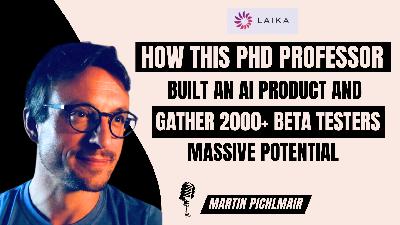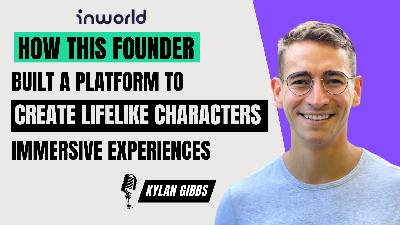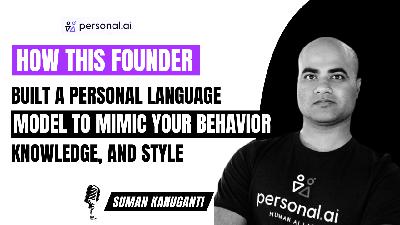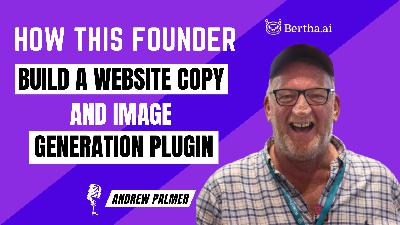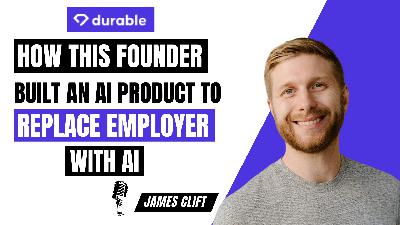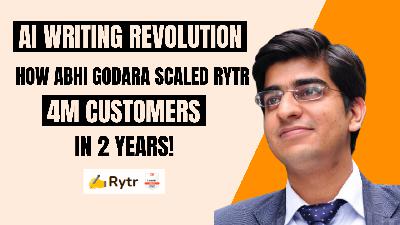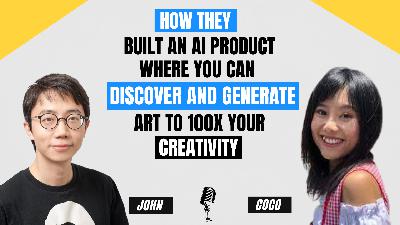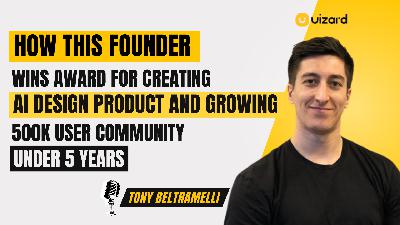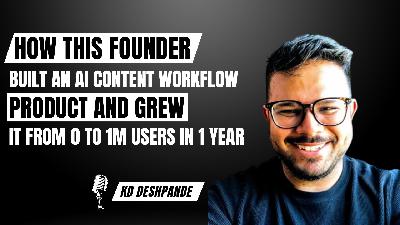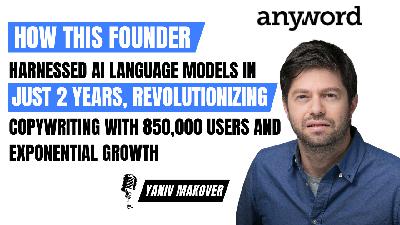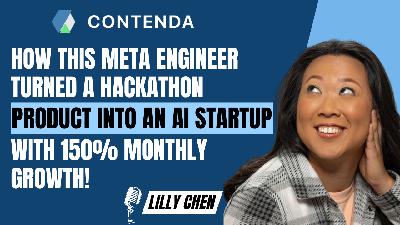What happens when a PhD Professor in Analytics launches an AI Writing Product?
Description
Martin Pichlmair is the CEO of Write with LAIKA, Associate Professor at ITU Copenhagen and Co-founder of Broken Rules. He Holds an PhD degree (Department of Informatics) in Vienna University of Technology. In today's episode, Martin explains that LAIKA is designed to make AI-generated writing more accessible and user-friendly, with the AI and the user working in a tight interactive loop. Martin highlights that their product uses a "no-prompt" system, which means users don't need to be skilled in prompt engineering to get meaningful results from the AI. Instead, the software handles most of the prompt engineering behind the scenes, making it easier for users to interact with the AI. Tune in to hear Martin's insights and experiences in building LAIKA and how you can apply these lessons to your own product.
Find the full transcript at: https://www.aiproductcreators.com/
Where to find Martin Pichlmair:
• LinkedIn: https://www.linkedin.com/in/martinpi/
Where to find Dhaval:
• LinkedIn: https://www.linkedin.com/in/dhavalbhatt
Transcript:-
Dhaval:
welcome to the call, Martin. Thank you for joining. Tell us a little bit about your product.
Martin Pichlmair:
Okay, so I'm Martin. I'm the CEO of Write with LAIKA. And our product is a kind of creative writing tool that is using large language models, in our case, quite small, large language models to, support writers when they get stuck or when they need more text, that is influenced by their previous writing.
Dhaval:
Wow. Okay. So when the writers get stuck or when they. Interested in continuing with the style and the tone of their previous work. They can use your product including the contents, the storyline, or anything along those lines.
Martin Pichlmair:
Yes. How LAIKA works is that you you upload existing writing. You have when you get, for example, stuck in a murder mystery because you don't know who the murder is. Funnily, we had that case twice already with users. And then you upload what you have written before and our, system fine tunes a language model With your text and then you can prompt the model to continue writing in your voice, in your using your characters. You mentioned using scenes you have been writing about in the past and very much sounding like you. Now you can do that with your own text. Or with the text of famous writers, we have, for example Dostoevsky in there and Jane Austen in there. And a lot of, all of them, of course, dead and out of copyright writers that you can also collaborate with in a similar way by asking them how they would continue a sentence, for example.
Dhaval:
Wow. So it has memory and context as well as style and the personalization built into it. So is that. Large language model that's very different from Chat GPT 3, which would spit out very confident phrases very long phrases. But they're also having the same style. Is that, how is that different from the large language models? You said that you have used large language models or you have you built on top of them or like, help us a little bit on how have you built this.
Martin Pichlmair:
So we've built this on very small, large language models. They're still in the same architecture and come from the same family, but they're very small because that gives us the ability to fine tune them very quickly. It takes like five minutes. If you upload , a half done book, for example, takes five minutes and you get your own, we call them brains because that's a nice metaphor. Your own brain based on your writing to interact with. Now, of course it has an understanding of the context, but it's not always super, like it doesn't have an actual understanding. It can just play with probabilities of words, just like all of those language models do.
Dhaval:
Wow. Very cool. Let's dive a little bit into your product journey, is this your first startup? Is this your first AI product? Tell us a little bit about your background, Martin.
Martin Pichlmair:
So I have a weird background. I did a PhD in computer science originally at the University of Vienna, at the tech university, and then worked in academia for a couple of years. I got a little bit, I don't know I wouldn't say bored, but I wanted to do something differently. So I started a video game company and then after a year started another video game company because the first one didn't work out. It didn't work out, but it also didn't not work out. It was fine. It was just not meant to be a longer existing thing. The second one actually is still around. It's called Broken Rules and makes awesome in the games. But I'm not involved anymore because I decided at some point to go back into academia. So that's where I spent the last seven years until last year where I just realized with my partner, That we have a huge connection between what I was doing in research, which was using generative AI to create systems for video games and her background, which is writing for video games. So we sat down and, uh, started workshops during the Covid Pandemic when everyone was sitting at home. We started online workshops where we introduced writers. To, the newest possibilities in language models, using very, very clunky tools at that point. And after three or so of those workshops, we realized the workshops are always poked out, but it's really hard to work with the tools that are there. So we decided we have to make our own tool, and that became a research project that was funded by the Danish state, uh, in the beginning. With the intention of turning it into a product. And since last November, we founded a company and turned it into an actual university spin off that is based on yeah, research that is now working on a product that we will commercialize within the next month
Dhaval:
Very interesting background. You do have like a very traditional computer science background, making you very competent in this area. Right. So, quick question. You mentioned that you launched this in November, but you haven't commercialized. It doesn't mean that the product has not launched yet.
Martin Pichlmair:
Yeah. We have a wait list and we have, a data with, nearly 2000 users. So there are a lot of people using it every day, but, it's not a commercially launched yet. We're still only free for select users.
Dhaval:
Very cool. Is this. Is this a self-funded or have you bootstrapped this whole thing? Are you intending to, or have you raised capital? And are you intending to raise capital as you move forward?
Martin Pichlmair:
Well, we got some funding from Danish State again. The program that we're in that funded turning research into a product last year that was still in the context of my university has a follow up program that funds your salary basically. So we are kind of weirdly half bootstrapped. We have no investor, but we have, our salaries covered by the Danish State but a very low salary. But still, it's good enough to, know that we'll be, we'll be around for another year at least while this funding runs. we're looking for investment in the moment. It's, we are talking to a lot of VCs. It is. It just takes a while it seems.
Dhaval:
Yeah. how is that playing out in this current market? Like how is that, can you give us have you done this before? And if you have, like how is it compared to the current market, if you can speak to that.
Martin Pichlmair:
So I haven't done it before, but a good friend of mine has a very similar company, actually a very different company, but also an AI company also in Denmark. And he also has an academic background. It's otherwise very, very different because it's B2B and started out much bigger than we are. But it looks like they, the climate they saw two years ago is very different to what we have now. So I'm getting all my tips from him and half of them don't work anymore. The climate is not good in the moment. Even in the hype space of creative ai, there is a lot of chicken egg problem, happening in the sense that investors wanna see. They actually want pay traction very often .They want to see some pay traction or immense numbers in weightless users or something like they wanna have proof of actual viability very early on. But it's such a new area that you are actually creating a market. So it's very hard to say where this whole journey is going because the whole, like AI is not super new. But generative AI is really something that is only a thing since like a year or so. It's very hard to say where the journey goes in the moment and, like it could all still just be overhyped. Then I would understand the need for having paid traction, but it could also be that we are just opening, creating a completely new market here, and then a little bit of trust would be nicer than having to prove things too early.
Dhaval:
Yeah. Yeah. Where are you in the product stage in terms of product development? Are you close to? I know you mentioned you were ready to launch in a few months. Are you close to finishing your product development? Is is that almost there? Li

